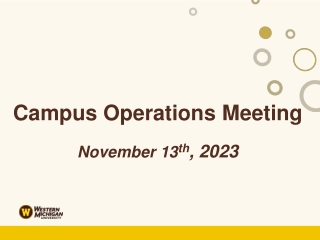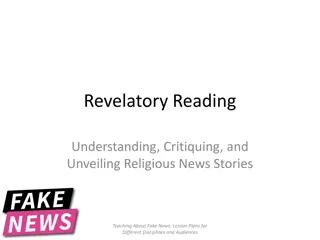Unveiling the Superstitions and Origins of Friday the 13th Fear
Explore the life and works of Samuel Taylor Coleridge, a renowned English poet, and delve into the concept of superstitions, including the fear of Friday the 13th known as paraskevidekatriaphobia. Discover common superstitions, the Christian origins behind the fear of this day, and how it influences people's decisions.
Download Presentation

Please find below an Image/Link to download the presentation.
The content on the website is provided AS IS for your information and personal use only. It may not be sold, licensed, or shared on other websites without obtaining consent from the author. Download presentation by click this link. If you encounter any issues during the download, it is possible that the publisher has removed the file from their server.
E N D
Presentation Transcript
Read this information through carefully. When you have finished read it again. You have two minutes. Samuel Taylor Coleridge The English poet was born in England, 1722 He was the youngest boy of the family who survived infancy. Two of his brothers joined the army, two went into the church, one joined the East India Company and one became a surgeon. Coleridge developed an intense imagination from an early age and gave himself nightmares reading The Arabian Nights at the age of six. His father died when he was nine years old. He was sent away to school and read classic literature. One of his teachers was the astronomer with Captain Cook on his second voyage and this may have inspired Coleridge s interest in travel and foreign lands. He was friends with William Wordsworth and they toured Germany together. Coleridge became a romantic poet and wrote about: nature, the purity of childhood, memory and imagination and the relationships between nature and the mind. In his writing he looks at fantastic imagery and magic. In his poem, Rime of the Ancient Mariner, Coleridge looks at superstition and omens
What do you remember? Samuel Taylor Coleridge
What is Superstition? - The belief that particular events happen in a way that cannot be explained by science or reason. Make a list of common superstitions
Paraskevidekatriaphobia What does this word mean? It is the term used for the specific fear of Friday the 13th! 5-6 million people are said to suffer from this in the UK! They believe something bad will happen on Friday 13th. There is always at least one Friday the 13th in each year. In some years there are two!
Fear Free? You may not take drastic safety precautions every Friday the 13th, but are you totally immune to the superstition? Given the choice, would you get married, start a new job or sign a contract on Friday the 13th? Most British people wouldn't, even though they would say they don t believe in the idea. Superstition has a way of creeping up on people when they're in a particularly vulnerable state.
The fear of Friday the 13th may have Christian origins. Thirteen is significant to Christians because it is the number of people who were present at the Last Supper (Jesus and his 12 apostles). Judas, the disciple who betrayed Jesus, was the 13th member of the party to arrive. Christians have traditionally been wary of Fridays because Jesus was crucified on a Friday. Additionally, some people who study religion hold that Adam and Eve ate from the forbidden fruit on a Friday, and that the Great Flood began on a Friday.
Apollo 13 Houston we ve had a problem! Launched on Friday 13th [Apollo 13 Damage] Apollo s 13th mission to the moon Lift off was at 1313 hours The explosion that crippled the spacecraft occurred on April 13. The sum of the digits in the numeric launch date of 4-11-70 is 13 The rocket was fired from launch pad 39, the third multiple of 13
Is a fear of the number 13 an old fashioned idea? Is a fear of the number 13 an old fashioned idea? Not really! Not really! In many hotels and skyscrapers, there is no 13th floor. Most airplanes have no seat No. 13. In Italy, it is usual to leave out 13 in numbering the lottery tickets. Thirteen guests for dinner? Not in France. A party of thirteen can hire a professional quatorzieme, a fourteenth person, from an agency. In some big hospitals, there is no Operating Room 13, to spare the patient added anxiety being wheeled into Room 13. HOWEVER 13 is the ideal number of people in a coven. It is believed that to left-handed people, 13 is their lucky number
Why might superstitions be popular? Can we ever disprove superstitions? Its nice to think we have some control over our own luck. Why is it difficult to disprove superstitions? What does luck mean? If we see a pattern we often start believing that it means something.
How might we measure truth? MY EXPERIMENT: I have two houses, one with a ladder over the door and one without. Inside the house are lots of things to trip over. I will see if more people trip in the house with the ladder rather than the one without.
Choose a superstition to prove: How might we measure truth? In pairs imagine you and your partner are scientists in a team. Your job is to find out whether your superstition is true or not. What sort of test might you come up with to prove or disprove the effect? A. Crossing paths with a black cat is unlucky B. A four leaf clover will give you luck C. A horseshoe over the door is lucky, but only if it is the right way up D. If you catch a falling leaf in Autumn, you will have one days good luck next year E. Breaking a mirror will give you seven years bad luck F. Spilling salt is bad luck, you must throw it over your shoulder to get rid of the back luck G. It is unlucky to put new shoes on a table H. It is unlucky to open an umbrella indoors I. It is unlucky to see a magpie on its own, but it is lucky to see two magpies together
If your left eye itches, you will laugh; if your right eye itches, you will cry. Very Superstitious Very Superstitious A dog howling was feared as a foreboding of evil. Here are some 18th Century superstitions. If a cat washed its face by passing its left paw over its left ear, a stranger would come calling that night. Have a guess if you think they are real or not. To pour gravy out of a spoon backwards (or rather backhanded) is unlucky because it foretells an argument ready to begin. These are all REAL! Always put on the left stocking first, because it would prevent getting a toothache. You must say bless you after someone sneezes because in the after expelling air from the nose, the Devil will attempt to jump into the sneezer s body.
What skills have used today? What knowledge have you learnt today? What previous knowledge have you used to help you today?

















































